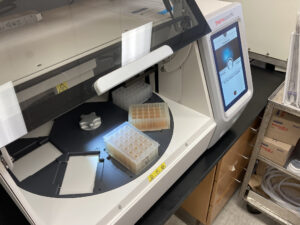
Wastewater from participating treatment plants are set up and loaded onto an instrument at the Wisconsin State Laboratory of Hygiene for automated concentration of the SARS-CoV-2 virus for quantification.
The Centers for Disease Control and Prevention has named the Wisconsin Wastewater Surveillance Program a National Center of Excellence for wastewater surveillance within the National Wastewater Surveillance System (NWSS). Wisconsin joins just three other CDC NWSS Centers of Excellence in the country.
The Wisconsin Wastewater Surveillance Program is a partnership between the Wisconsin Department of Health Services, the Wisconsin State Laboratory of Hygiene at the University of Wisconsin–Madison, and the University of Wisconsin-Milwaukee School of Freshwater Sciences. The Wisconsin Wastewater Surveillance Program was an early pioneer during the COVID-19 pandemic in developing and applying wastewater-based surveillance for SARS-CoV-2 and is recognized as a national leader in wastewater-based monitoring of human pathogens.
Community-focused wastewater surveillance is a cost-effective tool for public health practice. It involves looking for the presence of pathogens that people shed in sewage, whether or not they have symptoms, and measuring the pathogen levels over time. Individual testing is not required, and it does not depend on individual access to a healthcare or testing location.
By screening for pathogens in untreated wastewater at a given central wastewater treatment facility, wastewater surveillance can help determine whether infections are increasing or decreasing in the community served by that facility and provide early warning about the spread or prevalence of disease. This can help public health agencies engage in prevention efforts where they are most needed and complement other data that public health agencies collect with respect to disease spread.
